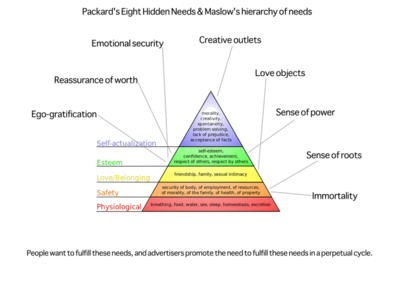8 Hidden Needs
In The Hidden Persuaders, first published in 1957, Packard explores the use of consumer motivational research and other psychological techniques, including depth psychology and subliminal tactics, by advertisers to manipulate expectations and induce a desire for products, particularly in the American postwar era. He identified eight "compelling needs" that advertisers promise products will fulfill. According to Packard, these needs are so strong that people are compelled to buy products to satisfy them.[1]
These 8 compelling or hidden needs are:
- Emotional Security: We all start out as fragile emotional beings and very few of us achieve deep emotional security, so we all keep seeking it.
Adverts play to this when they promise comfort, happiness, and the banishing of bad feelings. They may also play on the security aspect, emphasizing home, permanence, and safety.
- Reassurance of worth: In a connected world we can lose the sense of who we are and what we are worth. We thus seek reassurance that we are adding value and deserve our place in society.
Adverts play to this when they promise that if you buy products you will be doing the right thing, for example in saving the environment or helping others. Charities of course play to this all the time, praising you for helping those less fortunate (and maybe who are worth less). Celebrities are also used when they effectively say 'you will be admired and valued like me'.
- Ego gratification: Ego gratification is related to worth in that they are both about the sense of identity, but this is perhaps a little more base, where we need for praise and our egos to be 'stroked'. For example, when we do something at work we want to be congratulated and praised, much as we needed to be valued and praised as a child.
Adverts play to this when they praise us for buying products (perhaps ahead of time) or include praise of a sympathetic character (with whom we identify).
- Creative outlets: We all like creating and making things, and even a simple assembly process as with Lego toys can bring much pleasure. Many jobs have little creative content, leaving this need unfulfilled. We thus seek creative opportunities in other parts of our life.
Adverts offer creativity when they sell objects where we can be creative, from food ingredients to clothes. They may also touch our creative needs by being creative in the presentation they use.
- Love objects: Children and adults want both to love and be loved. Children have dolls and teddy bears, but what do adults have? They have one another, their cars, their pets, and their gadgets. They need something to love and if they do not have something they will buy or make one.
Adverts offer to take us back to childhood with child-like personalities. They sell us things to love and things for our loved ones (including our pets).
- Sense of power: When we are in control we have a sense of ability to choose and perhaps power over others. When we can direct others we move up the social order and so are, theoretically at least, safer. Big cars, chunky tools, solid houses, and old banks all make us feel safe and, when we own or use them, powerful.
Adverts thus emphasize the solidity and reliability of the products they sell. They insinuate how buying will put you in charge. They imply that you are in control when you decide to make that purchase.
- Roots: Our roots are a key part of our sense of identity. Where we come from, our heritage, our family, and our nation are important for that feeling of who we are. We identify with our old school, our college, where we were brought up, our country, our employer, and our religion. All are important, and the longer we stay in one place and the longer ago it happened, the more important it is for us. And yet we live mobile lives, flitting from place to place, job to job, and even marriage to marriage. We seek roots but in seeking to satisfy other needs we make ourselves rootless.
Adverts emphasize family, nation, team, and whatever else they can use to anchor you and hence you to them. They show that if you are American then they are American too. They make 'old fashioned' trendy by calling it 'traditional'.
- Immortality: Perhaps the biggest fear we have is of death. Or maybe not death but of ceasing, of becoming nothing. We likewise seek to create meaning in our lives so we may live beyond death. We have children, write books, build companies, and more. We also seek to cheat age, striving to look younger when perhaps we should grow older more gracefully.
Adverts play to this with age-defying products and spry older people playing and enjoying life. They use young people to help us avoid thinking about death and encourage us to recapture lost youth.[2]

Source: Grpast
See Also
References
- ↑ Defining the 8 Hidden Needs
- ↑ http://changingminds.org/explanations/needs/packard_needs.htm What are the 8 Hidden Needs?]
